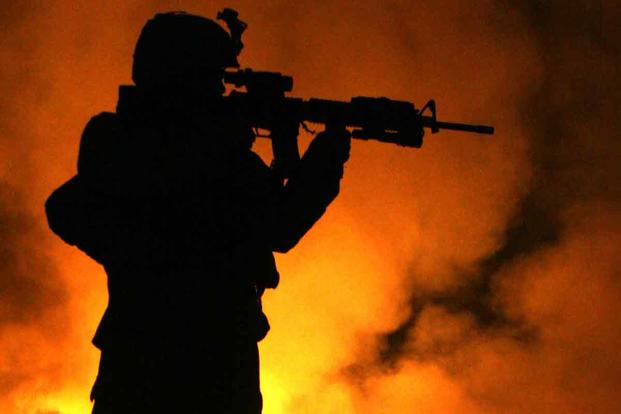The Senate Veterans Affairs Committee will consider legislation this week that would provide testing and health services to veterans sickened by exposure to hazardous chemicals in combat or garrison.
Sen. Thom Tillis, R-N.C., introduced the bill last week. It also would expand research on toxic substances found on military installations and used in combat, and broaden training among Department of Veterans Affairs medical providers to screen for possible exposures.
Read Next: She Was a Pioneering Coast Guard Rescue Swimmer. A Tsunami of Sexual Harassment Followed
The measure also would establish a commission to research the health effects of exposures to burn pits, hazardous waste, chemicals, runoff and other pollution sources and give former service members access to their Individual Longitudinal Exposure Records, kept by the Department of Defense.
Tillis, who was instrumental in creating the VA's Airborne Hazards and Burn Pits Center of Excellence, said he became involved in the issue after working with veterans and family members sickened while stationed at Camp Lejeune, North Carolina, where the drinking water supply was contaminated with industrial solvents for more than 30 years.
In 2012, Congress ruled that all veterans who served at Camp Lejeune for at least one month from Aug. 1, 1953, to Dec. 31, 1987, were eligible for health care from the VA and those with any of eight medical conditions considered related to exposure could receive disability compensation.
Family members with one of 15 diseases presumed to be related also were designated as eligible for health care paid for by the VA.
But veterans waited for years before they were given access to health care and services for their exposure-related illnesses.
"Veterans stationed at Camp Lejeune spent decades pushing for documentation of their exposure and fair treatment for the damages caused by the military, but this cannot continue to be the norm," Tillis said in a release Friday.
"After working alongside veterans who were stationed at Camp Lejeune and fighting for service members exposed to toxicants from burn pits in Afghanistan and Iraq, it's clear the men and women who served our country deserve better," he added.
At the height of the wars in Afghanistan and Iraq, the U.S. military used 270 pits to dispose of refuse generated by military operations, burning all sorts of material, including food and household trash; industrial and office equipment like tires, batteries, computer parts and furniture; hospital waste; and more.
Troops reported working and living under black clouds of thick smoke that emanated from the burn pits, and some say they have developed chronic illnesses, including respiratory diseases and cancers, as a result.
Other exposures encountered by service members include smoke from oil well fires set by Iraqi forces as they left Kuwait in 1991; nerve chemicals from the demolition of an Iraqi weapons cache, also in 1991; exposure to chemicals used for industrial cleanup, firefighting and other operations in the past 30 years; and radiation exposure.
Service members seeking to establish a link between military exposures and illnesses for the sake of receiving VA health care and disability compensation, however, have faced challenges over the past four decades because the Defense Department often failed to document the environmental conditions of locations where troops were stationed.
In addition, the VA decides most exposure claims on a case-by-case basis and, without clear proof of exposure or scientific evidence of a link between a chemical and an illness, veterans seeking health care or benefits are often denied.
Rep. Raul Ruiz, D-Calif., has worked since 2019 to pass legislation to help veterans exposed to burn pits. This year, four of his proposals are included in the proposed fiscal 2021 national defense policy bill.
The measures would require the VA to expand its Airborne Hazards and Burn Pit Registry to include veterans who served in Egypt and Syria; force the DoD to implement mandatory training on the health effects of burn pits for all medical providers; add a stand-alone question on burn pits to the services' post-deployment health questionnaires; and require the Pentagon to give Congress a report on any studies it is conducting on the health effects of burn pits.
Of Ruiz' proposals, the measure requiring the DoD to modify the post-deployment health questionnaire is most likely to become law, as the Senate's version of the National Defense Authorization Act also includes the provision.
"My bills will help bring us closer to providing the attention that this DoD self-inflicted public health crisis requires, quickly identify at-risk service members and give them the timely and appropriate care they need," Ruiz said after the House passed the defense bill. "Service members and veterans continue to become severely sick, permanently disabled, or die from respiratory failure, cancers, or autoimmune or other diseases due to toxic military burn pit exposure."
The Senate Veterans Affairs Committee will consider Tillis' bill, S. 4393, the Toxic Exposure in the American Military Act, on Wednesday, along with legislation proposed by Sens. Dan Sullivan, R-Ala., and Richard Blumenthal, D-Conn., that would require the DoD to assess the exposure to chemicals by troops who served at Karshi Khanabad Air Base in Uzbekistan, known better as K2, from 2001 to 2005.
The lawmakers will also consider a proposal from Sullivan and Sen. Joe Manchin, D-W.Va., that would affirm that most veterans were exposed to burn pits during military service overseas.
Tillis' bill has the support of nearly 30 advocacy groups that banded together last year to improve research, treatment and benefits for service members with diseases linked to environmental exposures.
"We're honored to stand alongside Sen. Tillis and others who are championing this necessary reform to help those coping with these specific wounds of war," Wounded Warrior Project CEO retired Lt. Gen. Mike Linnington said Friday.
-- Patricia Kime can be reached at Patricia.Kime@Monster.com. Follow her on Twitter @patriciakime.
Related: Military Firefighters Say DoD Isn’t Moving Fast Enough to Protect Them from Toxic Chemicals













